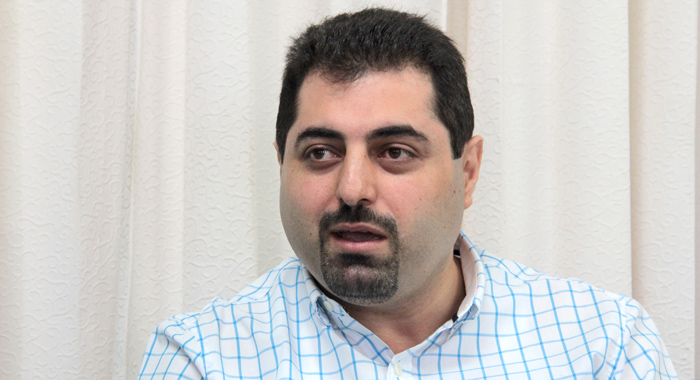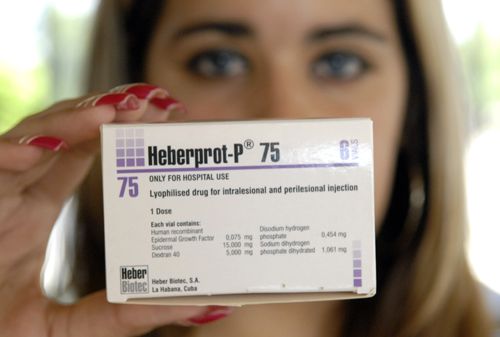Vincentians will later this year gain access to a drug that has healed foot ulcers in 80 per cent of patients usually unresponsive to other treatments.
The impending introduction of the drug, Heberprot-P, in St. Vincent and the Grenadines (SVG) comes as 142 cases of amputations as a result of diabetes have been conducted between 2008 and 2012 at the Milton Cato Memorial Hospital (MCMH), the nation’s primary health care facility.
During that same period, deaths as a result of diabetes have doubled, as the nation continues to struggle with the impact of Chronic Non-Communicable Disease.
Heberprot-P was developed in Cuba and has been in use in several countries around the world since 2007, including in Latin America, Africa and Europe.
A group of Cuban specialists will visit on March 18 to assess the need for the drug in SVG and when it comes on stream later this year it will be available exclusively through the public health sector.
Speaking at a press conference on Tuesday, Dr. Bary Aussi, consultant general surgeon at MCMH, said the drug promotes complete granulation in more than 80 per cent of cases, with complete wound healing in more than 50 per cent of the patients, usually unresponsive to other treatments.
“Mean wound healing time was 13 weeks. The recurrence rate was low, thus, further amputations were avoided and, as a consequence, patient quality of life improved,” Aussi said.
He, however, said that patients’ response to the drug varies.
“… it depends on the state of this ulcer. You cannot give a special time for it,” he explained, pointing out that the drug is used for grade 3,4, and 5 ulcers, adding that grade 3 will heal faster than 5.

Aussie pointed out that drug will decrease hospitalisation time since patients will visit their health care provider every other day to have the drug administered.
Aussi noted that while the 80 per cent success rate is very high, the drug is not effective in every patient.
“So it is not a magic medication. It’s not for everybody. This medication, they need to select the patients that will get benefit from it. So, with this, we decrease the amount of amputation, we decrease the amount of hospitalisation, but we don’t say it is a cure one hundred per cent. It is higher rate; with the method we have, it will give us a better rate, but it is not for everyone.”
He said the selection will be based on the size of the ulcer and blood circulation to the affected area, most likely the leg.
“If you have a patient with a dead foot, you cannot put a life in this. We have a lot of patients, they come with gangrene, smelly foot and they say ‘I don’t want to cut this foot’,” Aussie said.
“It is obviously dead, so, for sure, this medication will not work for those people who are at this stage … So that means we need to see some sign of life before we inject this medication.
“Sometimes, [as] with everything you inject it and you don’t get what you want, because the response will be different. But 80 per cent is not a small thing; 80 per cent is a very high rate,” Aussie said.
Acting Chief Pharmacist, Levi Walker, told the press conference that Heberprot-P is patented in 40 countries, including the United States, and registered in 20 countries.
“The evidence is out there that his drug, Heberprot-P, is producing results,” he said, noting that it is being used in Asia, Latin America, Europe and is undergoing trials in China.
“The pharmaceutical department, right now we are really elated to know that this option will be one that we can grasp. And it certainly will make a big difference in the way we manage diabetic foot ulcers,” he said.
“The profile on the drug is very good, the success rate is impressive and the documented side effects are basically minimal. We can look at injection site irritation, maybe some slight fever, headache in some cases, but nothing that can’t be treated with conventional medication.”
He, however, said that the challenge with the drug is to harness the data from long-term studies regarding side effects over a long time, noting that the drug has only been in use for seven years.
“And therefore the evidence that support whether there are any significant adverse effects over a long term, that is still to come in. But what we have seen, from what we have heard, from the documents and the literature we have read, from the reviews and the reports that are out there, these reviews are from sources we can trust. The belief right now is that Heberprot-P offers an option that we will be ready to embrace, and that will basically create a turning point in the treatment of diabetic foot ulcers in St. Vincent and the Grenadines,” Walker said.
He said he did not know as yet how much the drug would cost, but said the expenditure will be justifiable.
“What is the cost for a person to lose a leg, a person who cannot work, maintain their families, a person whose quality of life is less than optimal? So, we have to look at the cost of the drug in relation to not having that,” he told reporters.







In 2013 I wrote a letter “Heberprot-P, can we expect it just in time for the next elections?”
Now I can say once again “Told you so”
I have been writing about it online and in newspapers since Cess Mckay came back from Cuba and told us we would be getting it then, and thats four and a half years ago.
Peter Binose
OK! Great news! The cost? I am sure the people who fall into this category are poor people, so will the drug be available to them? That would be good news to all Vincentians. By the way: Why is the introduction of the drug so late to Vincentians, seeing the PM has such good relationship with Cuba? An early action or reaction could have saved many lives and feet. Did the airport issue put all other things affecting the lives of SVG nationals on the back burner? Where was Ces and did he know about this drug? Why does it appear that SVG nationals have to suffer and die before the government takes action just before an election? Just asking.